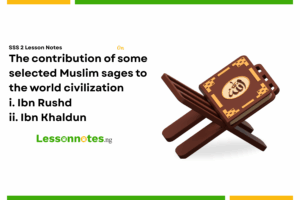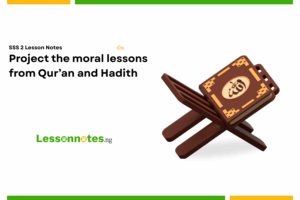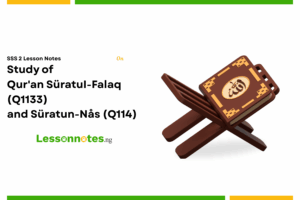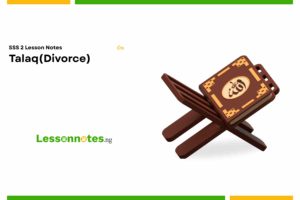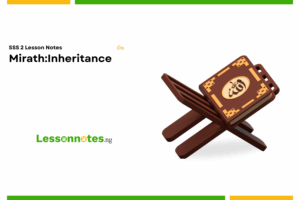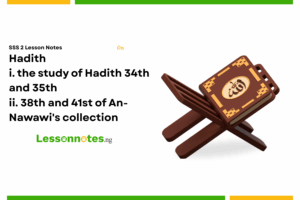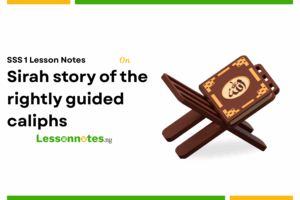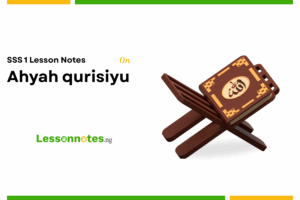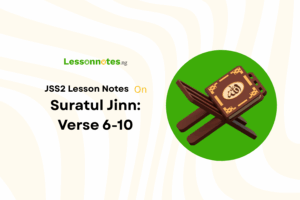Hadith 32, 34, 35, 38, 41 of Imam An-Nawawi SS3 Islamic Studies Lesson Note
Download Lesson NoteTopic: Hadith 32, 34, 35, 38, 41 of Imam An-Nawawi
Hadith 32. No harming nor reciprocating harm
It was related to the authority of Abu Sa’id Sa’d bin Malik bin Sinan al-Khudri (RadhiyAllahu ‘anhu) that the Messenger of Allah (SallaAllahu ‘alayhi wasallam) said:
“There should be neither harming nor reciprocating harm”
(A hasan hadith which Ibn Majah, Al-Daraqutni and others related as of sound isnad, but which Malik related in his Muwatta’ as of broken isnad, from ‘Amr bin Yahya, from his father, from the Prophet (SallaAllahu ‘alayhi wasallam) but dropping (the name of) Abu Sa’id. This hadith has lines of transmission which strengthen one another (so that it may be regarded as sound instead).)
Brief Commentary
- This hadith is evidence of the miraculous nature of the speech of the prophet (SallaAllahu ‘alayhi wasallam), in that he used to say very short sentences which carry very great meanings
- This hadith contains a very important maxim of fiqh
- A maxim of fiqh is a principle used to derive rulings. It is unique in the sense that muftis/scholars can derive rulings directly from the maxim.
- Maxims of fiqh also make us aware of the philosophy and essence of the shari’ah
- There are five major maxims of fiqh that the shari’ah is based upon. These are:
- Actions are but by their intentions
- Difficulty brings ease
- Certainty is not removed by doubt
- Harm is to be removed
- Customs are a legislation
Hadith 34
On the authority of Abu Sa’eed al-Khudri (RadhiyaAllahu ‘anhu) who said: “I heard the Messenger of Allah (SallaAllahu ‘alayhi wasallam) say, “Whosoever of you sees an evil, let him change it with his hand; and if he is not able to do so, then [let him change it] with his tongue; and if he is not able to do so, then with his heart — and that is the weakest of faith.” [Reported by Muslim]
Brief Commentary
- This hadith is a pinnacle in setting the guidelines for a great aspect of Islam, which is to enjoin the good and forbid the evil
- Virtues of enjoining the good and forbidding the evil:
- All the previous prophets used to encourage it as mentioned in Surah Al A’raf [7:157]
- Allah describes the believers to have these qualities as mentioned in Surah At-tawbah [9:71]
- Allah describes the hypocrites as not having these qualities as mentioned in Surah At-tawbah [9:67]
Hadith 35. Brotherhood Part
On the authority of Abu Hurayrah (RadhiyaAllahu ‘anhu) who said: The Messenger of Allah (SallaAllahu ‘alayhi wasallam) said, “Do not envy one another, and do not inflate prices for one another, and do not hate one another, and do not turn away from one another, and do not undercut one another in trade, but [rather] be slaves of Allah and brothers [amongst yourselves]. A Muslim is the brother of a Muslim: he does not oppress him, nor does he fail him, nor does he lie to him, nor does he hold him in contempt. Taqwa (piety) is right here [and he pointed to his chest three times]. It is evil enough for a man to despise his Muslim brother. The whole of a Muslim is inviolable for another Muslim: his blood, his property, and his honour.”
[Reported by Muslim]
Brief Commentary
- This hadith focuses on the concept of brotherhood in Islam, and what destroys brotherhood
- Brotherhood in Islam is not a theoretical concept and is not just feelings we hold for one another
- It consists of actions, many things we should do, and many things we should stay away from.
- You cannot attain true brotherhood without knowledge as knowledge is needed to fulfil certain actions as we are told to e.g. the correct way of demanding your rights from a brother
- The Arabic word used in this hadith for envy means mutual envy where both sides envy each other. Similarly the Arabic words used in this hadith for inflating prices on one another, hate, and turning away from each other, where all imply the action being done in a mutual manner
Hadith 38. Attaining Allah’s love
On the authority of Abu Hurayrah (RadhiyAllahu ‘anhu) who said: The Messenger of Allah (SallaAllahu ‘alayhi wasallam) said, “Verily Allah (Glorified may he be) has said: ‘Whosoever shows enmity to a wali (friend) of Mine, then I have declared war against him. And My servant does not draw near to Me with anything more beloved than the religious duties I have obligated upon him. And My servant continues to draw near to me with nafil (supererogatory) deeds until I Love him. When I Love him, I become his hearing with which he hears, and his sight with which he sees, and his hand with which he strikes, and his foot with which he walks. Were he to ask [something] of Me, I would surely give it to him; and were he to seek refuge with Me, I would surely grant him refuge.’ ”
[Reported by Bukhari]
Brief Commentary
- Scholars said this is the most noble hadith in describing the friends of Allah, so it is a mighty and important hadith
- This hadith gives us the methodology of becoming friends with Allah and the consequences of being friends with Allah
- Due to its importance, scholars authored books on it. Imam Al-Shawkani wrote a 500+ page book on this hadith
- From Surah Yunus [10:62-64] we can see that to be a friend of Allah, you need to be a believer (excel in faith) and pious (excel in actions)
- These are three levels of the friends of Allah, taken from Surah Fatir [35:32]:
- {Wronged themselves}: Generally good people, but sometimes miss obligations or fall into sins
- {Stay between right and wrong}: Fulfil obligations and don’t sin, but don’t go further than that. May carry out disliked actions
- {Foremost in doing good deeds}: These are the elite of mankind. They fulfil their obligations and don’t sin, and they also strive and excel in doing recommended actions and avoid disliked actions
Hadith 41. Desire of a believer
On the authority of Abu Muhammad Abdullah bin ’Amr bin al-’Aas (RadhiyAllahu ‘anhu) who said: The Messenger of Allah (SallaAllahu ‘alayhi wasallam) said, “None of you [truly] believes until his desires are subservient to that which I have brought.”
[Imam Al-Nawawi says: We have related it in Kitab al-Hujjah with a sahih chain of narrators]








